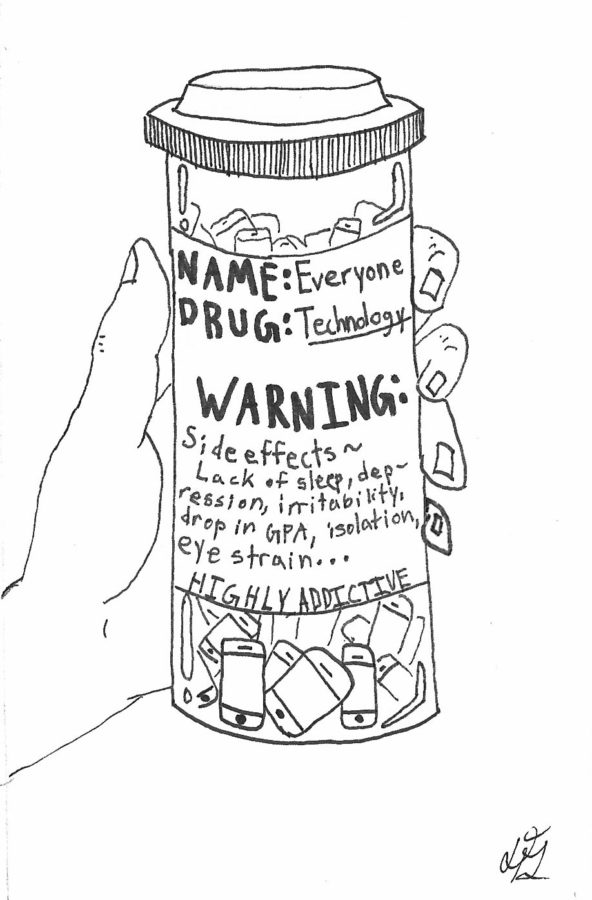Stay Off Devices and Live in the Moment
Cartoon by Dylan Gates.
2.34 Billion. As of 2018, that is the number of people worldwide who use social media, according to Statista.
With the introduction of revolutionary technologies such as 3D printing, renewable energy cars and, most of all, the internet, there is no doubt that our world has greatly benefited from the fruits of modern advancements. Despite these facts, social media is taking a toll on our minds and our way of life, destroying much of what we are as human beings.
Whether we are on the bus to school, at home or in bed, our eyes are glued to the glowing screen. As we continue to use platforms such as Twitter, Instagram and Snapchat, we become more susceptible to distraction, self-deprecation, and, most of all, we lose our ability to communicate and express ourselves. One of the most notable detriments is social media’s effect on productivity in the workplace and school environment.
A 2010 University of Maryland study revealed that 18 percent of social media users are unable to keep off Facebook for more than a few hours, and 61 percent of users looked at their media feeds at least each day. The frequent need to check social media is a sign that may lead the overuse of these popular platforms.
Not only does social media serve as an unavoidable distraction and time drain, but it also influences our interactions with other human beings. By using online messaging systems such as Instagram’s direct messages or Facebook’s messenger app, we are given an excuse not to interact with people face-to-face. As a result of this, our ability to interact with one another in real conversations or through cues like body language and tonality greatly diminishes.
“Teenagers, between the ages of 12-17, report using text messages in their daily lives more than any other form of communication, including face-to-face interaction,” New York Behavioral Health organization reported. “The mere presence of mobile phones inhibited the development of interpersonal closeness and trust,” Dr. Andrew Przybylski reported in his 2012 psychology study.
While social media gives individuals the opportunity to express themselves through pictures, descriptions and interactions with other users, a person’s social profile can often project a superficial representation of oneself. This is exemplified in teenagers’ heightened consciousness of body image and appearance.
“51 percent of women between the ages of 18 and 24 said they feel pressure to look perfect on social media,” a study conducted by Today reported.
This hyper-consciousness of body image causes many other problems such as anorexia and bulimia. The Park Nicollet Research Center reported that “Over 50% of teen girls and 30% of teen boys use unhealthy weight control behaviors such as skipping meals, fasting, smoking cigarettes, vomiting, and taking laxatives.” Similarly, a University of Pittsburgh research project revealed that people who used social media on a regular basis were 2.6 times more likely to develop eating disorders.
So the next time your phone rings with an Instagram or Snapchat notification, think about how your interactions on social media will affect yourself and others. Sometimes the best thing to do is leave it unread.
Your donation will support the student journalists of Portola High School. Your contribution will allow us to purchase equipment and cover our annual website hosting costs.

Jordan Lee, commonly referred to as “The Flash,” is your Visual Director. He has held the positions of front page and photo editors in previous years...




